‘Overnight’ success extends SWAN Systems global reach
Perth agritech startup, SWAN Systems’ innovative approach to water management has received global recognition at Rabobank’s FoodBytes! Pitch 2020 agtech winner. The multi-faceted solution provides a ‘data playbook’ for users to save precious resources year-on-year and achieve better yields at lower costs.
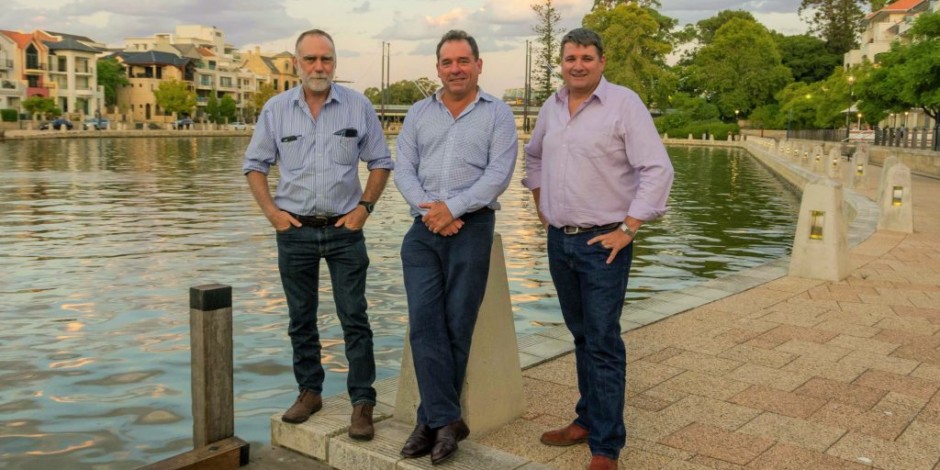
SWAN Systems chairman Rod Campbell said winning Rabobank’s FoodBytes! AgTech award is a fabulous outcome for the Perth agritech startup, providing the opportunity to connect with international investors, during a Series A investment raise.
“It’s validation of the years we’ve been doing this – we’re an overnight success after five years of hard work,” said Rod, with a laugh.
“It wasn’t just winning Rabobank’s AgTech award from a field of more than 300 applications from 14 countries, but there were probably 600-odd companies that logged into the virtual pitch, so we had this incredible global audience.”
Launched in 2016, SWAN Systems helps large-scale water users to apply precisely the right amount of water and nutrients at the right time for optimal plant growth, using data from a variety of field and forecasting devices.
FoodBytes! is an international program run by the global food and agriculture financier Rabobank that showcases food and agritech startup companies to corporate leaders, investors and the wider market. Competition winners in three different categories: Consumer Food & Beverage (CPG), Food Tech and Agtech, each received $10,000 and consulting support to contribute to their business growth.
US venture capital providers understand ‘patient’ capital
“We put in a pitch looking to raise $5million and we’ve got a number of conversations going with venture capital providers in the United States, where there are some really specialised funds that have an appreciation of agtech and patient capital,” said Rod.
Patient capital, also known as long-term capital, means investors are willing to wait for long-term returns – a key ingredient for startups during seed-stage funding rounds.
RELATED: Impact investing and what it means for the agrifood economy
“In Australia, some funds give you a shorter term, maybe three to five years, whereas people who specialise in the US agtech sector appreciate that the term of investment can be much longer, 7-10 years, which gives you the breathing space to be able to scale or evolve the product.
“Often you’ve got a farmer or producer who said, ‘I like the tech, let me try it on one block or one farm’ and the next year they might scale it to two or three farms and the next year you might have much broader coverage.
“So for that patient capital is required, and it’s been a really useful outcome making those connections with specialist investors that really look at agtech as a distinct class of investment.”
New global customers attracted by award
Already new customers have emerged as a result of SWAN Systems winning the Rabobank award.
“The Mexican sugar growers contacted us and said we really need what you’re offering, so we’re working on a commercial relationship with them. We’re doing work in Africa and we were contacted by one of the US’s largest coffee growers in Hawaii – so all of a sudden this global audience has opened up,” said Rod.
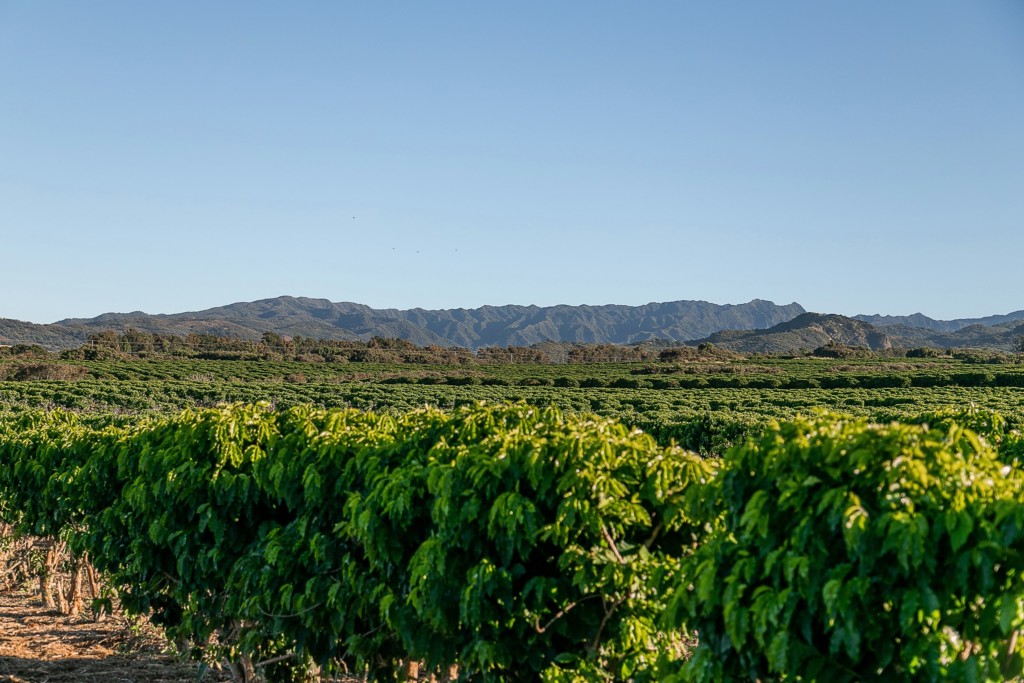
Hawaii’s largest coffee estate located on 3,100 acres and surrounded by 4 million coffee trees. Photo credit: Kauai Coffee Company Facebook
“We hope to trial across seven or eight different commodities or enterprises over the next season or two and Rabobank will be able to help us with that because they have a pilot program as an add-on to the pitch competition.”
SWAN has been engaging proactively with global hardware providers for some time, like Reinke and Valley Irrigation. Rod said, they’re keen to promote us as leverage for people that use their systems.
“Arable is a very sophisticated AgTech company based in San Francisco that uses different technologies, including spatial imagery that we’re working closely with and bringing them into a trial we’re doing in South Australia. They’re going to bring us into some trials in the US too if it all goes according to plan.”
SWAN is also in discussions with a company in Abu Dhabi to help tackle their “enormous water issues” and potentially work with councils, municipalities and the agricultural sector, in partnership with Aquamonix.
SWAN’s adaptability is a winning feature, according to Nathalie Gibson, Head of Innovation, Knowledge and Networks for Rabobank’s FoodBytes!.
“Their technology is highly scalable, due to its hardware-agnostic approach to water management and their potential for collaboration across the industry is vast.”
“This includes potentially partnering with other precision ag innovators to collect additional types of data to fuel their own platform. This adaptability allows them to quickly expand across regions and sector, with few barriers.”
Compliance ‘critical’ for food producers
Rod said people are increasingly appreciating devices, technology and software to manage resources better in the move towards sustainable production and regenerative agriculture.
“One of the clear points of difference is we are hardware agnostic. We don’t care what system you use; we’ve written scripts that can take data in from over 70 different devices.”
RELATED: Why SWAN Systems’ valued their intangible assets, like data
He said the increasing trend towards social licence makes compliance a critical factor for farmers and food producers.
“We’re noticing in New Zealand there’s this increasing social licence where farmers have to really prove that they’re using things smartly – resources, water, nutrients – and tracking what they’re doing.
“The old ways of ‘set and forget’ irrigation is just not good enough anymore and being able to prove that what you’re doing is sustainable and that you’re improving your water efficiency is critical.”
Nathalie said the most impactful startups, are the ones that are able to bridge the gap with existing food production systems and shifts in consumer demand.
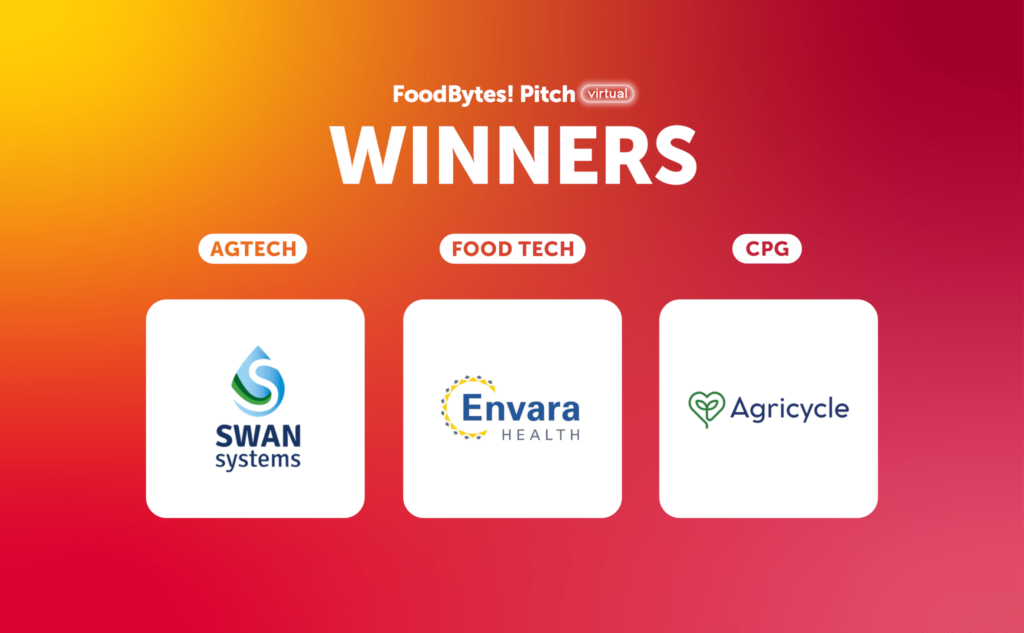
“The three finalists we had, Agricycle Global (CPG), Envara Health (Food Tech) and SWAN Systems (AgTech), positioned their products and technology as multi-faceted solutions relevant to multiple stakeholders.”
Success stories show returns on investment
Rod quoted examples of SWAN Systems’ success in reducing costs and environmental impact for key clients in South Australia, South Africa and Western Australia.
“We did a big project with SA Water last year and determined that across 14 urban parks, over-watering averaged 30%. That’s pretty typical – how often have you been frustrated that it’s raining and the Council or Golf Club sprinklers are on?
“Matanuska, Zimbabwe’s largest banana producer, used SWAN Systems to reduce their water use by a third or about 2.6 megalitres/hectare, and the saving on the cost of pumping the water was about $270/ha or a seven-fold return on investment.
“In horticulture, Fruitico grape growers in WA used SWAN to monitor watering on a first-year crop and yielded about 18kg per vine, when typically, you get around 5kg. And 95% of that product was graded first class, so it was a quality and quantity outcome.”
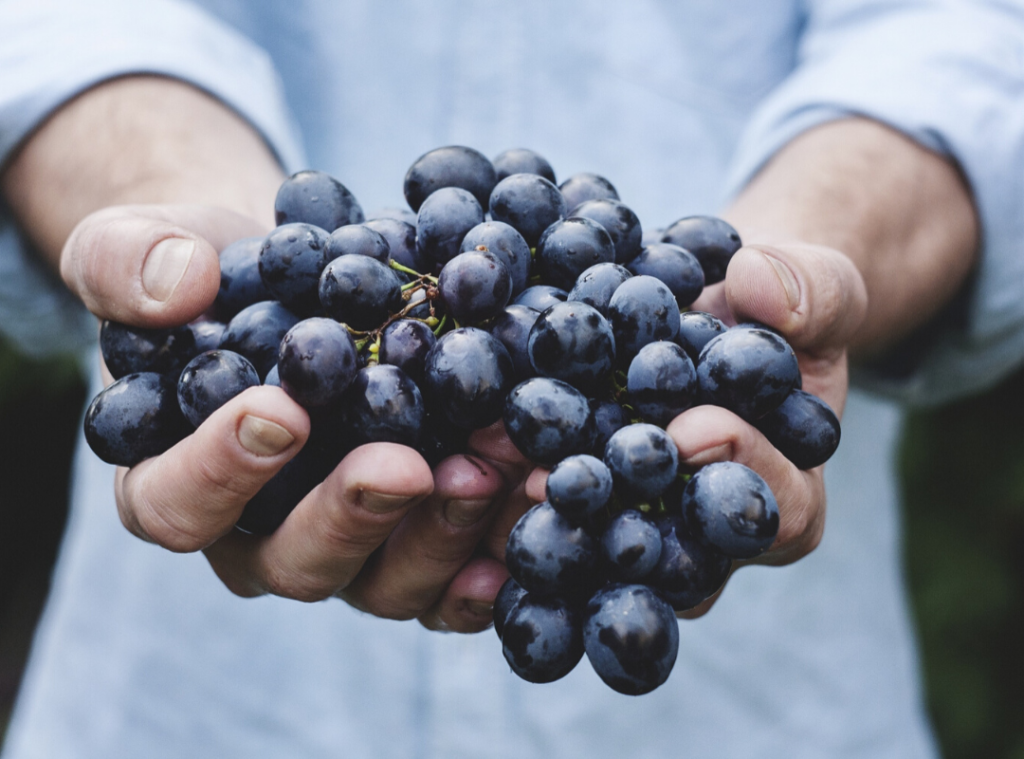
Data retained when employees move on
A hidden benefit, he said, is SWAN’s ability to develop a prescriptive ‘playbook’ that enables users to repeat the process year on year and retain valuable data in the case of employee turnover.
“A lot of that information is kept in the head of the irrigation manager or consultant – but what happens if that person leaves or you change consultants?
“SWAN actually records that data and that’s really important corporate IP.” This process creates a ‘playbook approach’ for users that’s “valuable retention of information”.
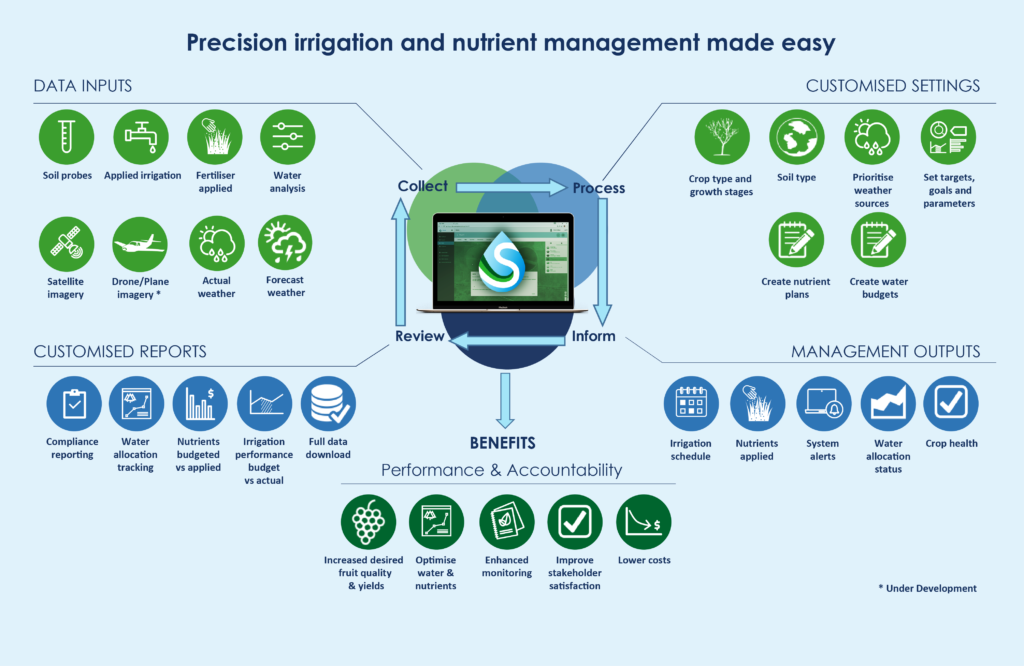
Advice for agritech startups – ‘be bold and brave’
“You’ve got to be bold and brave and – realistic with time frames,” said Rod. “We thought this would all happen in a much shorter time frame at a much lower cost but invariably it just takes longer and costs more.
“Be really focussed on the commercial outcomes. You might have a great product but how are you going to get it to market, how do you differentiate what you’ve got relative to others?”
Rod emphasised on building relationships. “You’ve got to be patient and focus on relationships – and make sure you’ve got the capital, because nothing’s for free. The best time to raise capital is when you’re not really needing it. Always be on the lookout for it.”
RELATED: How trade agencies help businesses go global
COVID has surprisingly enabled greater global networking opportunities that’s levelled the playing field for Australian startups, along with increased investment, Nathalie explained.
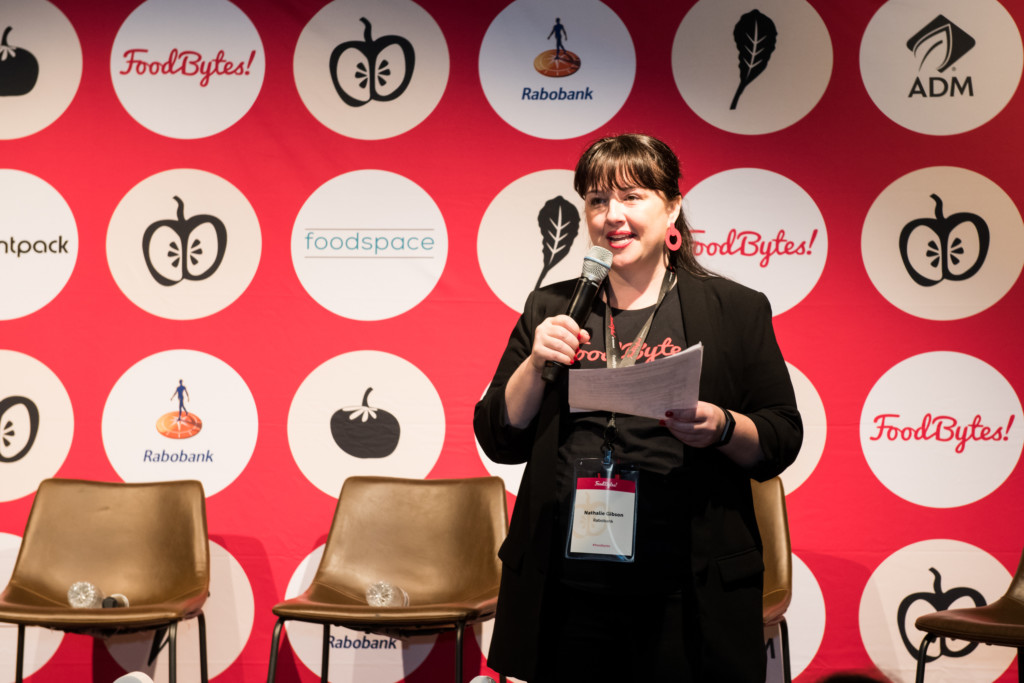
Nathalie Gibson, Head of Innovation, Knowledge and Networks for Rabobank’s FoodBytes!
Food and ag companies based in Asia gained US$3.8 billion VC investment in 2020, more than doubling the $1.5 billion in 2019 (according to Pitchbook). In 2020, about 30% of these deals went to companies in China and India each, followed by 8% in Australia, 6.5% in Japan, and 6% in Singapore.
“We had over 300 applications last year and for SWAN to take home the agtech award globally – is a true testament to the kind of talent we’re fostering here in the region.”
RELATED: Rabobank’s FoodBytes! 2021 Innovation Trend Report
Nathalie concluded, “Both investors and corporates are very much looking to increase their innovation collaboration– so bring on 2021! We really want to find more great Australian startups solving problems that address the global food system challenges.”
Enjoyed this story? Want to learn more about the Asia Pacific region’s innovative agrifood tech ecosystem? Sign up for our newsletter here and receive fresh stories about global leaders, farmers, startups and innovators driving collaborative change.
